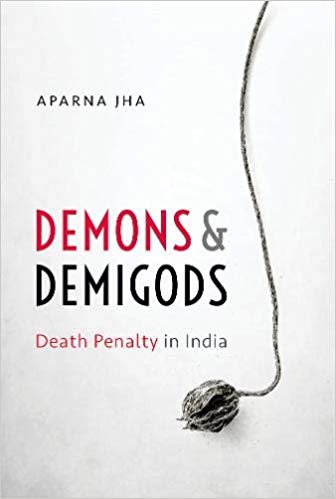Is it time death penalty be abolished in India?

Saurabh Tankha
First, an honest confession. When Demons & Demigods: Death Penalty in India (Oxford University Press; Rs 495) first reached me, I thought: “Another lawyer, and one with a criminal background, attempting to move out of the confines of a courtroom to write a book? Surely, must be drab and boring. Must have talked about court cases, murders, rapes, dacoity…” Yes, the author Aparna Jha has indeed written about court cases dealing with criminal offences in India but the ease with which she moves on from one case to another is commendable and praiseworthy. Each of the story, rather real life case, is intense, gripping and written in lucid language. Full marks to Jha for highlighting a subject (death penalty in India) which many shy away from. I am sure, like me, you too will put the book down once you have read it – cover to cover.
Jha, a practising lawyer in the Supreme Court (SC) of India, through the book Demons & Demigods recounts how she successfully defended four death row inmates. They were serial killers who had hacked 10 able-bodied people to death. “They would carry bags full of arms – swords, rods, muzzle-loader guns – and would then take their victims, mostly gullible businessmen, to a hillock and kill them. The bodies were later discovered later by the cops: a half-eaten hand, a headless torso of a woman crawling with maggots. At times, these bodies were put in gunny bags.”
This case, shares Jha, came to her through a letter dated December 23, 2011 by the Secretary, Supreme Court Legal Aid Services (a body that provides free legal aid to the poorer and weaker sections of society). She had to only defend one of the accused to begin with but by the time the matter was finally argued, she represented all the four accused.
For someone who does not believe in death penalty as “anyone – absolutely anyone – has the right to take away a human’s life”, the author says she began studying cases and scanning judgments relevant to her case from 1950 onward when the SC was set up. Jha puts in she “started off by researching on the case finer Supreme Court Cases Online which has a database of cases and law… Unless I understood the death penalty law in India, I could not proceed further… I had little experience in this area, and yet four lives depended on me and my senior colleague. I knew that if I let them down, there would be nobody else to help them. Unlike me, my peers believed the boys had got what they deserved, that they were responsible for their own fate. I felt otherwise. They were little more than children. How could I simply let them be killed – even by the state?”
It was during this process the author noticed the “top court had debated on the death penalty. If the victim had been roasted alive, the culprit was to be hanged. The state would show no mercy to those who had revelled in burning men and women alive, deaf to their pleas of mercy. The guilty could, however, be spared if they had been in jail for a long time, or if they were old and frail by the time their case reached the top court. They had already died a thousand times by then, and it was thought that hanging would really serve no purpose.”
During her effort to find as to why were the four awarded death penalty by the lower courts, Jha found that the “Indian law is based on the British Common Law. Thus, the Indian judicial system is pyramidical in structure, and all guidelines laid down by the top court are studied minutely and followed by the lower courts.” I too agree with her when she says “many legal systems the world over are based on common law — nothing wrong in continuing with it! Of course, those provisions which have become archaic should be done away with.”
Jha has also included her meeting several legal luminaries during the process of the case. These people had been closely associated with the evolution of death penalty laws in India. She took their expert views on the law and her case.
But then the question remains – Should death penalty be abolished in the land famous for non-violence? Is it time for the legislature to put an end to death penalty? Who and when will it be decided remains to be seen? Till then the debate shall continue…
Do share your views on death penalty in India at lifeandmoreplus@gmail.com and we shall publish them here


